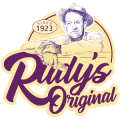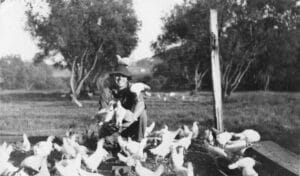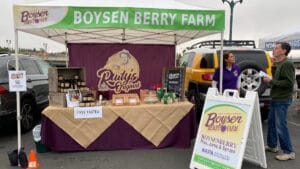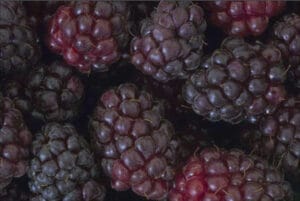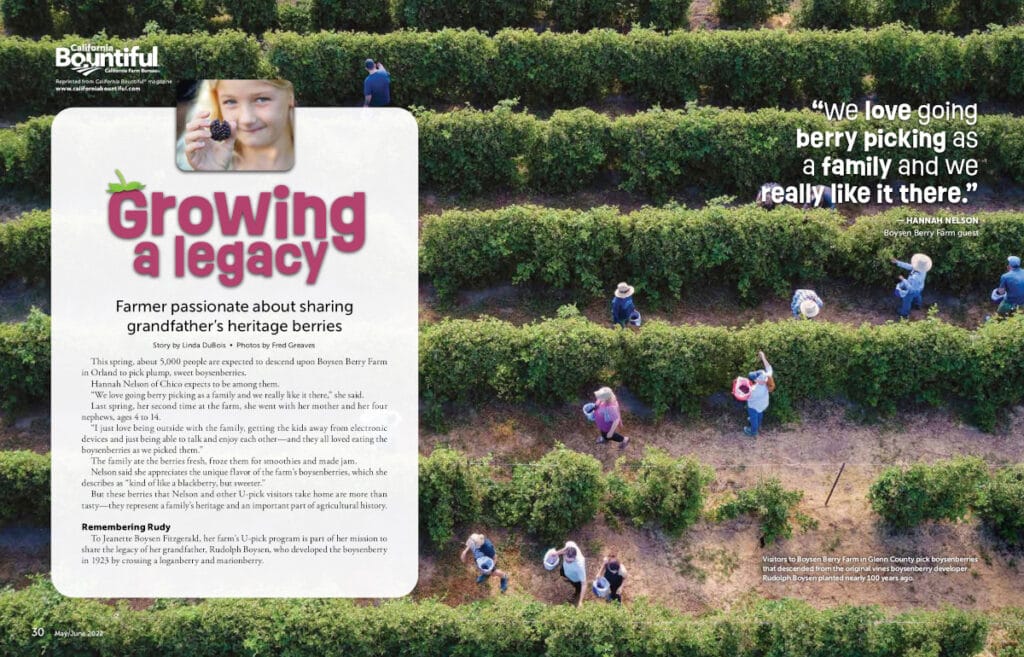
Growing a Legacy
Farmer passionate about sharing grandfather’s heritage berries – May/June 2022 California Bountiful magazine, Story by Linda DuBois, Photos by Fred Greaves.
This spring, about 5,000 people are expected to descend upon Boysen Berry Farm in Orland to pick plump, sweet boysenberries.
Hannah Nelson of Chico expects to be among them. “We love going berry picking as a family and we really like it there,” she said. Last spring, her second time at the farm, she went with her mother and her four nephews, ages 4 to 14.
“I just love being outside with the family, getting the kids away from electronic devices and just being able to talk and enjoy each other—and they all loved eating the boysenberries as we picked them.”
The family ate the berries fresh, froze them for smoothies and made jam. Nelson said she appreciates the unique flavor of the farm’s boysenberries, which she describes as “kind of like a blackberry, but sweeter.”
But these berries that Nelson and other U-pick visitors take home are more than tasty—they represent a family’s heritage and an important part of agricultural history.

Remembering Rudy
To Jeanette Boysen Fitzgerald, her farm’s U-pick program is part of her mission to share the legacy of her grandfather, Rudolph Boysen, who developed the boysenberry in 1923 by crossing a loganberry and marionberry.
Now trademarked Rudy’s Original Boysenberries, Boysen Berry Farm’s berries are not the typical commercially available boysenberries. They come from the original vines her grand- father planted nearly 100 years ago along a creek bed on a Napa prune orchard he managed. Boysen Fitzgerald and her husband, Tom Fitzgerald, grow 2,400 of these heritage vines on their 10-acre plot, half of which they lease to alfalfa growers.
Just a few years ago, the longtime special education teacher and her husband were living in Las Vegas and could have never predicted their current life.
The story began in June 2016 when Boysen Fitzgerald got a phone call.
It was from Chris Jepsen, a historian for the Orange County Archives, who was co-writing an article with Anaheim historian Steve Faessel about her grandfather and the history of the boysenberry. The pair were hoping to get family stories and information from her—but it’s what she learned from them that set in motion a chain of events that led the couple to retire, uproot from Las Vegas and become farmers in California.
She didn’t know much about her grandfather’s history, in part because he had suffered a terrible fall that led to health problems and he died young, before she was born.
She knew he had developed the boysenberry in Napa and had moved to Orange County, where he became the Anaheim City Parks superintendent. She also knew he had provided some vines to Walter Knott, founder of Knott’s Berry Farm, who made the berry famous.
But she didn’t know her great-uncle had dug up one of her grandfather’s original vines and planted it at his home. “I had photos of my grandmother eating from that backyard vine, but I didn’t know the significance of that,” Boysen Fitzgerald said. “And I didn’t know it had been kept in the family.”
Following a lead from a 1958 Napa Valley Register article, Jepsen had tracked down Alice Masek of Castro Valley, a Boysen family member growing an original vine (a fact later confirmed by DNA testing). Boysen Fitzgerald contacted Masek, who gave her some vine cuttings.
Boysen Fitzgerald credits her husband for encouraging her to pursue growing the vines on a large scale. “Tom said, ‘You know, Nettie, this is your heritage. You need to embrace this.’”
Her destiny was confirmed when an old friend offered Boysen Fitzgerald growing space in her San Diego County vineyard, free of charge. “I was, of course, very excited about having a chance to grow these vines,” Boysen Fitzgerald said.
Launching a business
She started with 24 vines, naming each after a family member or friend, and repeatedly made the five-hour drive from Las Vegas to care for the patch.
By November 2017, the couple had propagated more than 950 starts and needed a larger space. Their search eventually landed them on their Orland plot, christened on Feb. 16, 2018. The couple took turns making the 10-hour drive from Las Vegas while waiting for their home to sell. The following October, they moved into a fifth-wheel RV on the farm, with plans to build a home as soon as they “have time.” The house may have to wait a while.
They’ve also started a boysenberry product line of jam, sauce and syrup. The two make all the products themselves in a commercial kitchen in Chico during the evenings after Boysen Fitzgerald gets home from her job as a teacher’s aide.
Next up is expanding their nursery business so heritage vines can proliferate.
Eventually, they plan to double their growing space by planting on the 5 acres they are now leasing out.
Come and get ’em
The public can buy some vine starts as well as Rudy’s Original jam and syrup at this year’s U-pick, a program they started in 2019. It is expected to run daily from May 14 until early June. Admission is free and berries are $7 a pound.
Visitors will be greeted with tips on picking the perfect berry and a bucket lined with a bag to take the berries home in. They will find berries with an intense, complex flavor that
taste like the parent plants, Boysen Fitzgerald said. “I can taste the blackberry and the raspberry and the marionberry.”
The farm has 80 rows, with each U-pick group getting its own row. Originally organized that way to ensure pandemic safety, it’s turned out to be a great way to ensure each row gets picked and everyone gets plenty of berries.
The U-pick method works perfectly with boysenberries since fragile berries must be handpicked and don’t all ripen at the same time, Boysen Fitzgerald said. Plus, visitors just seem to really enjoy it, she added.
“It’s just so wonderful to hear kids picking the berries say, ‘Look at the big one I found!’ It’s my favorite time of year.”
She was especially thrilled with the response of one of last year’s participants: A woman gave the farm’s jam and syrup as holiday gifts and in each package included a card donned with a picture of her and her husband picking the berries. “We are Christmas-card worthy!” Boysen Fitzgerald said.
She said as soon as this U-pick season is over, they’ll start planning for next year—the boysenberry’s 100th anniversary. “We definitely have to prepare some activities to properly celebrate.”
Linda DuBois [email protected]
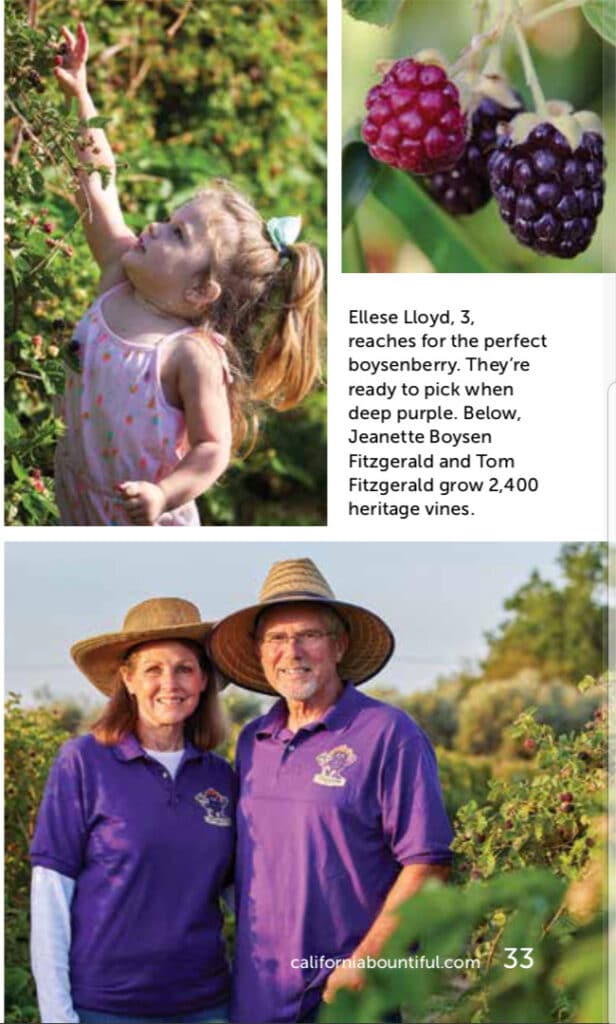
- Post author:admin
- Post published:May 1, 2022
- Post category:News
- Post comments:0 Comments
